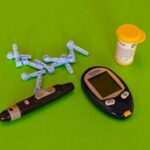If you have diabetes, you will know that “fruity scented breathing” is a common symptom of the disease.
Many of you may have had the sweet taste and smell of the disease for weeks before you get diagnosed.
But what many people don’t know is chronic bad breath, alternatively known as pathogenicity, and diabetes may even hold hands many years after it is first diagnosed.
So, what is the relationship between bad breath and diabetes?
This article explains the relationship between the two conditions, what the cause is, and how to prevent it from continuing in the future.
Why do people breathe sweet scents before a diabetes diagnosis?
The classic “fruity scented breathing” before the diagnosis of diabetes, particularly type 1 diabetes diagnosis, can be a sign of diabetic ketosidosis, or DKA.
Many people experience this condition before being diagnosed with diabetes.
If you have a fruity scented breath with other symptoms, you should call the clinic or immediately test for diabetes for emergency medical assistance.
- Dry the mouth
- I increased my thirst
- Frequent urination
- Weight loss
- Extreme fatigue
- headache
- Body pain
- confusion
But if you already have diabetes and you don’t have a fruity scent breath, then just as flat out bad Breathing, something different may be happening.
There are many causes of mouth and bad breath, including eating strong foods, brushing your teeth regularly, or genetic design, but there are two main reasons why certain diabetics may struggle with bad breath.
Besides acute cases of DKA (more fruity scent than “bad”), diabetics can develop bad breath due to periodontal disease and high levels of ketones in the blood.
Because bad breath is so common in diabetic patients, researchers found that infrared respiratory analysers are effective in identifying both prediabetics (elevated glucose levels) and early stage type 2 diabetes.
Both causes of bad breath can be preventable and both can be treated.
Periodontal disease
Periodontal disease, or periodontal disease, includes conditions of gingivitis, mild periodontitis, and progressive periodontitis.
It is very common as one in three people with diabetes struggle with periodontal disease.
This is also difficult to lower blood sugar levels, as high glucose levels promote the growth of the bacteria in the mouth and the growth of the bacteria in the mouth (and thus infection).
This creates a vicious cycle for diabetics to combat both the causes of both oral infections and periodontal diseases.
As infections make it difficult to lower blood sugar levels, prolonged periodontal disease can worsen diabetes management, so it is important to look at your dentist regularly and get early periodontal disease treatment before the problem progresses further.
Symptoms of periodontal disease include bad breath, recession of the gums, red/soft gums, and sensitive teeth.
Even if you don’t have periodontal disease yet, having excess bacteria in your mouth can cause bad breath, and the increase in bacteria can be attributed to an increase in blood sugar levels.
Treatment of early stage periodontal disease can also help reduce bad breath and ultimately cure it.
Our guide will help you learn more about dental health and diabetes. Diabetes and Your Teeth: How to Keep Your Mouth Healthy.
Ketones in the blood
Another reason why people with diabetes may have bad breath is the ketones in their blood.
When the body lacks insulin instead of metabolizing glucose for energy, it starts to metabolize fat for energy and produce ketones.
Ketones are not necessarily dangerous. You can use ketones that do not have high blood sugar levels when fasting (such as intermittent diets, blood test fasting, surgery, or procedures), or you can eat a ketonogenic diet that is a very low carbohydrate.
However, using ketones in your blood and urine can cause bad breath. Acetone, a type of ketone, can even smell the breath like a nail polish.
Normally, if you wash away your ketone body (eating low blood sugar, carbohydrates, fasting or eating carbohydrates in an extremely low carbohydrate diet), your bad breath should go away.
If you test medium or high ketones (with a simple urine test), and your blood sugar levels exceed 250 mg/dl for more than a few hours and do not come down with insulin, call your doctor immediately or seek emergency medical attention.
This can quickly lead to diabetic ketoacidosis (DKA). This can be fatal if not treated properly.
Treat and prevent bad breath from diabetes
Unfortunately, bad breath is a relatively common event, but following these strategies it is highly curable (and preventable!).
- Brush your teeth with every meal and don’t forget to floss and gargle points
- Brush your tongue every day (where many bacteria grow)
- Meet your dentist for regular cleaning at least every six months (some dentists look at cleaning up to triple diabetic populations per year, but check with your health insurance plan to see if any extra cleaning is covered).
- Drink plenty of water every day and don’t get dehydrated
- Look at your endocrinologist regularly
- Properly control HBA1C (Aim for it
- Test your ketones regularly and try to avoid them whenever possible
- Do not smoke. It worsens bad breath
- Chew sugar-free gums to stimulate saliva production. This helps to wash your bad breath
Conclusion
Bad breath and diabetes are unfortunately linked, but this issue is very common, treatable and may be preventable with the adoption of appropriate treatment and prevention strategies.
The two main causes of bad breath in diabetic patients are periodontal disease and ketones in the blood or urine.
If you have diabetes and are struggling with bad breath, it may be a sign of your body telling you that something is wrong.
Test your ketones regularly and if you are struggling with blood glucose levels above 250 mg/dL from ketone levels of a few hours or so, seek immediate medical consultation.
Check your dentist regularly to make sure you know you have diabetes. This will help you treat the early stages of periodontal disease. Keeping your blood sugar levels within range can also help prevent periodontal disease.
It is best to prevent these conditions before they occur. Therefore, maintain blood glucose and HBA1C levels within the target range and ensure that you regularly see an endocrinologist to adjust your diabetes care plan.
Always brush your teeth with every meal and brush your mouthwash and floss every day. Brushing the tongue helps in mouth mucus as it tends to grow bacteria that cause bad breath.
Drinking plenty of water can help wash away the bacteria that breathe in. Chewing sugar-free gum can also mask bad breath and promote saliva production.
Finally, don’t smoke.
Hopefully these strategies will help treat and prevent the onset of pathogenic diseases, a common occurrence in people living with diabetes.









